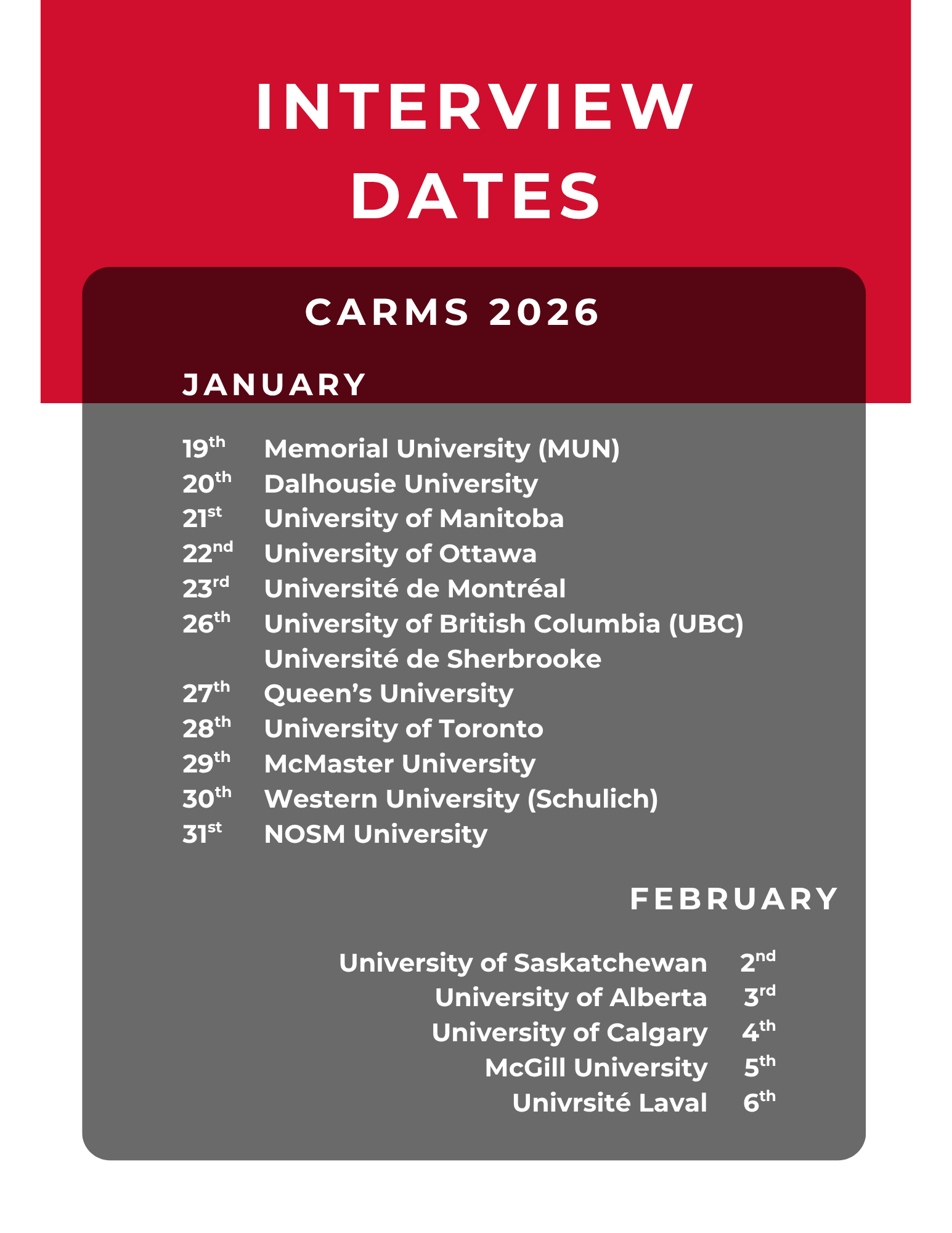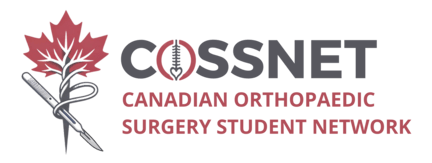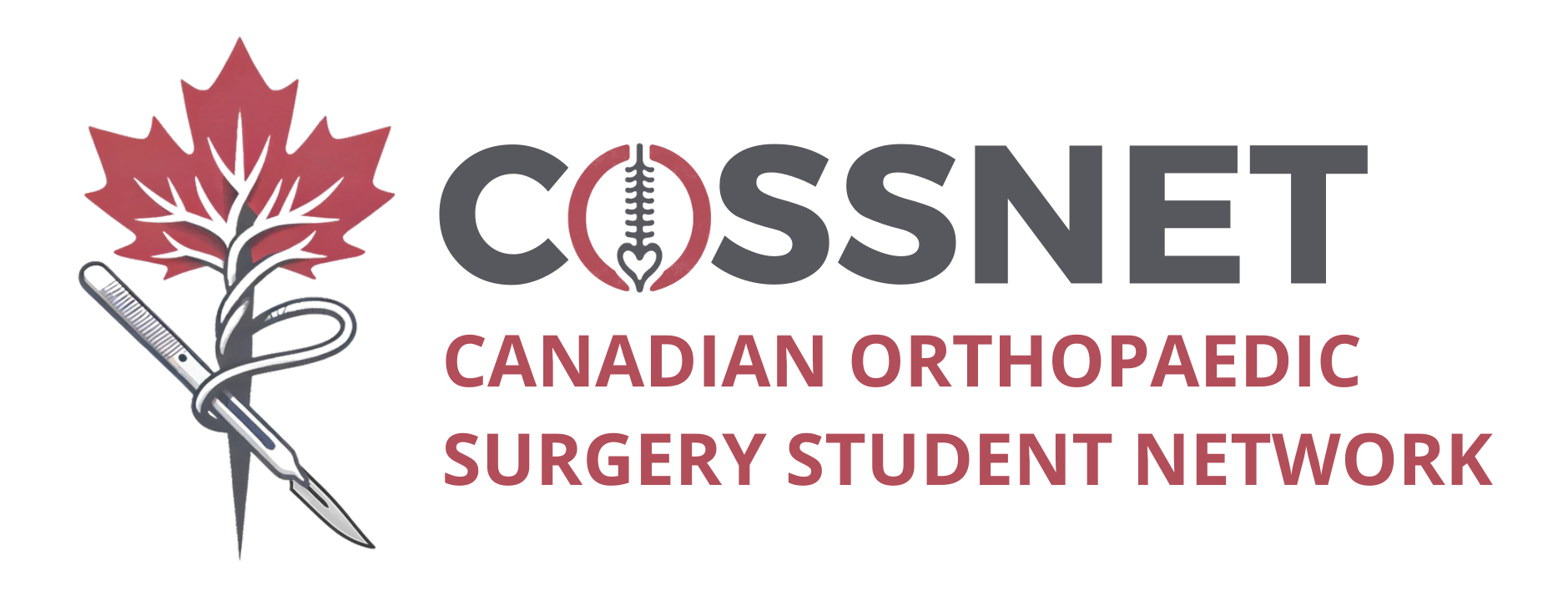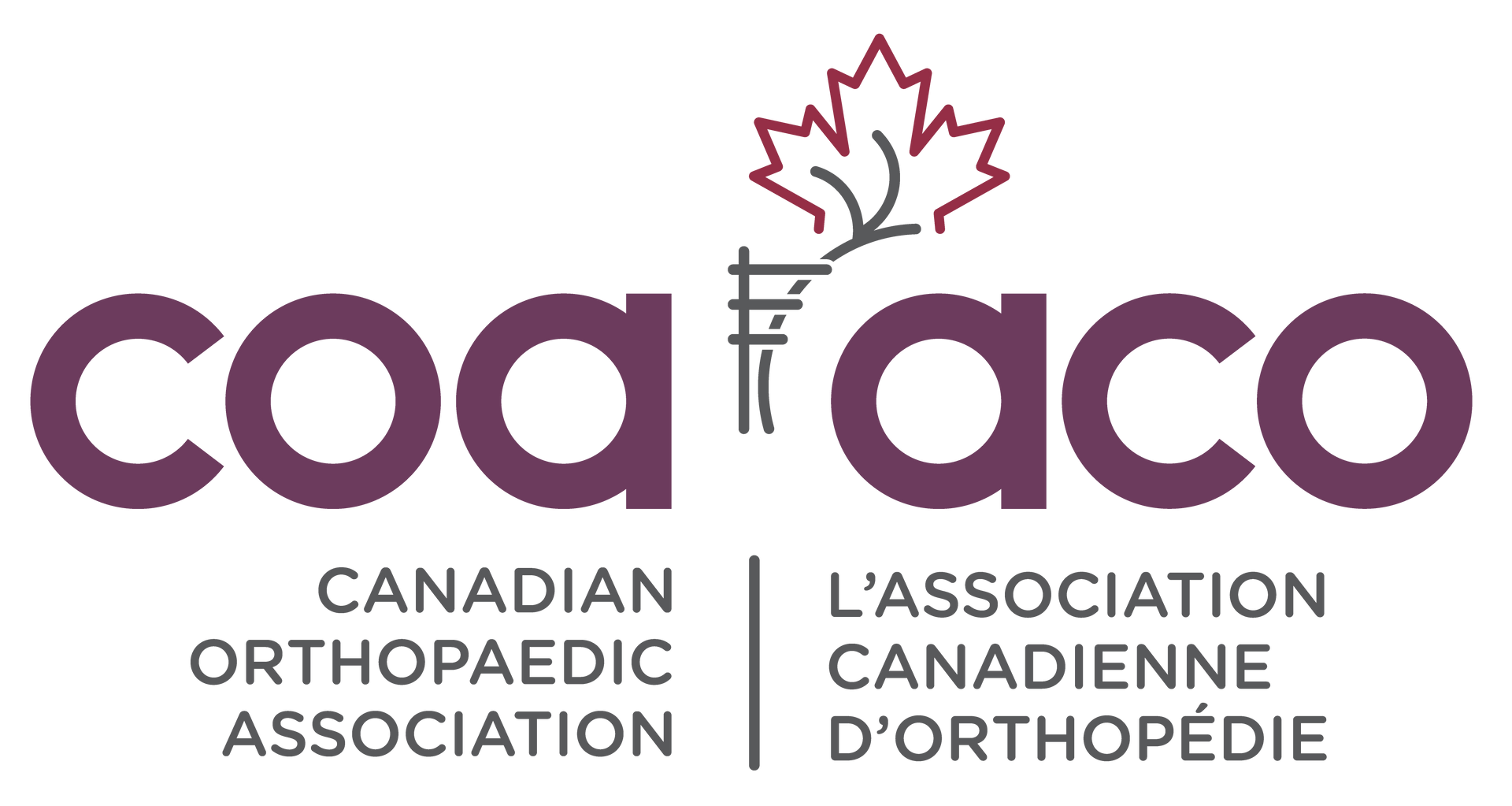NAVIGATING CaRMS
Your Guide to CaRMS Applications in Orthopaedic Surgery
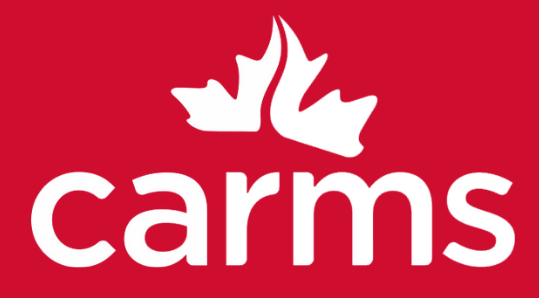
You've gone through most of your medical studies, explored multiple specialties, and made sure Orthopaedic Surgery is truly the field for you. Now, you're probably wondering: what’s next?
Now is the time to start thinking seriously about your CaRMS application! This can feel like a very stressful moment, but remember: this is your opportunity to showcase everything you’ve worked hard for over the past few years and make your application stand out. Let’s break it down step by step.
Understanding the Timeline
The first thing you need to do is get familiar with the CaRMS timeline. Knowing when each step happens (application submission, interviews, rank list deadlines) will keep you organized and help you plan ahead. We’ve created a visual timeline on this page to help you track all the important dates, so you don’t miss anything critical.
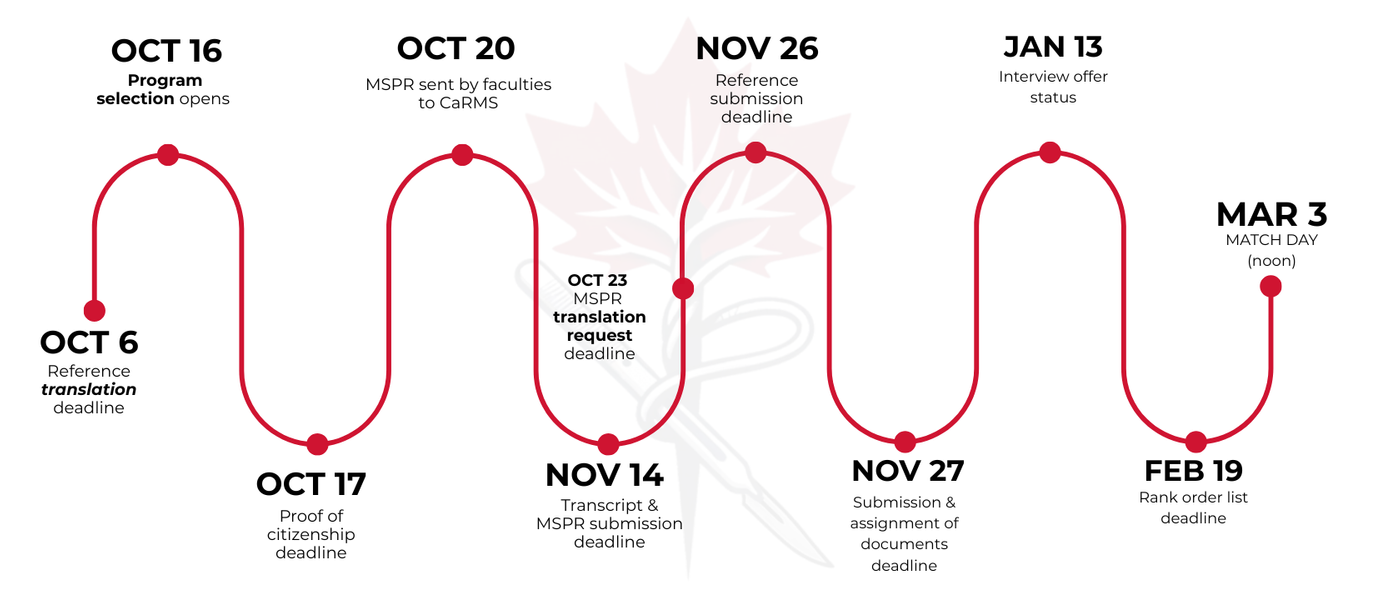
Program-Specific Requirements
Each Orthopaedic Surgery residency program has unique application criteria. Some programs may require a CASPer test, photos, or specific reference formats. Others may have unique interview styles, such as MMI or panel interviews. All require your CV and transcripts. Take the time to check out each program’s requirements carefully; you don’t want a small oversight to hold you back. Use our table on this page to see the breakdown for each program. In case of doubt, it is important to refer to the official CaRMS website.
Updated for the 2025-2026 application cycle.
| Program | Interview Type | Photo | Reference Letters | Personal Letter | CASPER | Other Criteria |
|---|---|---|---|---|---|---|
| Memorial University of Newfoundland | Panel (Jan 19, 2026) | ✓ | 3 reference letters | ✓ (Max 500 words) | ✗ | Applicants who complete orthopaedic experiences at their home institutions are viewed favorably, but onsite electives are not required. |
| Dalhousie University | Traditional / Panel (Jan 20, 2026) | ✓ | 3 reference letters | ✓ (Max 750 words) | ✗ | Applicants are expected to have at least some orthopaedic electives within a broad, well-rounded set of experiences, though onsite electives are not required. |
| Université Laval | MMI (Feb 6, 2026) | ✓ | 3 reference letters | ✓ (Max 1000 words) | ✗ | Completing an orthopaedic surgery elective is encouraged but not required for selection, electives at the institution are not mandatory, and research experience is considered a positive asset. |
| Université de Sherbrooke | Panel (Jan 26, 2026) | ✓ | 2 reference letters | ✓ (Max 350 words) | ✗ | Candidates are encouraged to complete at least one elective in the discipline, but electives at the institution are not required. |
| Université de Montréal | Panel (Jan 23, 2026) | ✓ | 3 reference letters | ✓ (unlimited word count) | ✗ | Candidates are encouraged to complete at least one orthopaedic elective (ideally at the institution) but it is not required |
| McGill University | Panel (Feb 5, 2026) | ✓ | 3 reference letters | ✓ (unlimited word count) | ✗ | Applicants are encouraged to complete at least one elective in orthopaedics, and while onsite electives at the institution are recommended for better evaluation, they are not required. |
| University of Ottawa | Traditional / Panel (Jan 22, 2026) | ✓ | 3 reference letters | ✓ (unlimited word count) | ✗ | Candidates are encouraged to complete a broad range of electives, including at least one in orthopaedics. |
| Queen’s University | Panel (Jan 27, 2026) | ✓ | 3 reference letters | ✓ (Max 1000 words) | ✓ | Applicants who have completed a broad range of electives, including orthopaedics, are strongly considered, but onsite electives are not required. |
| NOSM University | Panel (Jan 31, 2026) | ✓ | 3 reference letters | ✓ (Max 1000 words) | ✗ | Applicants who have completed a broad range of electives, including orthopaedics, are favored, but onsite electives are not required. |
| University of Toronto | Panel / MMI (Jan 28, 2026) | ✓ | 3 reference letters | ✓ (Max 1000 words) | ✗ | Applicants who have completed a broad range of electives, including orthopaedics, are preferred, but onsite electives are not required. |
| McMaster University | Panel (Jan 29, 2026) | ✓ | 3 reference letters | ✓ (unlimited word count) | ✗ | Applicants who have completed a broad range of electives, including orthopaedics, are preferred, but onsite electives at the institution are not required and not having done one will not affect the application. |
| Western University | Panel (Jan 30, 2026) | ✗ | 3 reference letters | ✓ (unlimited word count) | ✗ | Applicants who have completed a broad range of electives, including orthopaedics, are preferred, but onsite electives are not required. |
| University of Manitoba | Panel (Jan 21, 2026) | ✓ | 3 reference letters | ✓ (Max 500 words) | ✓ | Applicants are encouraged to complete at least one elective in orthopaedics, but onsite electives are not required. |
| University of Saskatchewan | Traditional (Feb 2, 2026) | ✓ | 3 reference letters | ✓ (Max 750 words) | ✓ | Applicants are encouraged to complete at least one orthopaedic elective, electives in other specialties are also valued, and while onsite electives are preferred, they are not required. |
| University of Alberta | Panel (Feb 3, 2026) | ✓ | 3 reference letters | ✓ (unlimited word count) | ✓ | The program values applicants with broad clinical experiences and does not give preference for numerous or onsite electives in orthopaedics. |
| University of Calgary | Panel (Feb 4, 2026) | ✗ | 3 reference letters | ✓ (Max 1200 words) | ✗ | Applicants are encouraged to complete at least one orthopaedic elective to explore the field, ideally in multiple locations, while also gaining experience in other medical specialties; onsite electives are not required. |
| University of British Columbia | Traditional / Panel / MMI (Jan 26, 2026) | ✓ | 3 reference letters | ✓ (Max 500 words) | ✗ | Applicants must complete at least one orthopaedic surgery elective in their final year to be considered, with institution electives encouraged but not required, and successful applicants typically complete two to three electives. |
Personal Statement
Your personal statement is your chance to tell your story and show why you’re a great fit for Orthopaedic Surgery and for each program you’re applying to. Remember, each program is a little different, so tailor your statements to highlight what excites you about that specific program and location. Attending the COSSNET Pre-CaRMS Roundtable Series can help you learn about unique aspects of each program to include in your statement.
Ask yourself:
- How have your prior experiences prepared you for a career in Orthopaedic Surgery?
- Why this program and/or location?
- What personal qualities or connections make you an ideal candidate?
- What individual accomplishments, teamwork, or leadership experiences can you showcase?
- Is there a meaningful experience, challenge, or impactful event that shaped your interest in orthopaedics?
Common pitfalls to avoid:
- Generic or copy-pasted personal statements.
- Exaggerating experiences or achievements.
- Ignoring feedback from mentors or peers.
The goal is to tell a cohesive, compelling story that highlights both your clinical competence and your personal qualities.
Letters of Reference
References are a key part of your application, so it’s important to approach them strategically. Choose individuals who know you well clinically and can provide specific examples of your skills, work ethic, and teamwork. Ideally, they should be able to speak to both your clinical competence and personal qualities that make you a strong candidate for Orthopaedic Surgery.
Make sure your referees understand the submission process, as most programs now use structured reference forms rather than traditional letters. Provide them with ample notice and any relevant information about the programs you are applying to so they can tailor their responses effectively. A thoughtful and detailed reference can make a strong difference in how your application is perceived.
Tips and tricks:
- Ask early to give your referees plenty of time.
- Provide a summary of your experiences and achievements to help referees write a detailed and accurate reference.
- Follow up politely to ensure forms are submitted on time.
- Consider choosing a mix of referees who can speak to different strengths, such as clinical skills, leadership, or teamwork.
Interviews & Socials
Interviews may be stressful, but they’re also your opportunity to show your fit with the program, and remember, they’re a two-way street. It’s just as important for you to determine whether the program, culture, and location are a good fit for you.
- Types: Know if your programs are doing MMI, panel, or hybrid formats.
- Preparation: Practice mock interviews with friends or mentors, and review common questions around teamwork, motivation for orthopaedics, and resilience.
- Program research: Prepare for each interview by learning as much as you can about the program, including any unique aspects or special considerations (e.g., more rural rotations, focus on research, resident wellness initiatives).
- Socials: Some programs hold in-person socials. Attend if you can as it’s a chance to meet residents and faculty in a low-pressure environment, get a feel for the culture, and ask questions that aren’t typically covered during formal interviews.
The key is to go in prepared, confident, and ready to engage as both a candidate and a future team member. Interviews are as much about fit for you as they are about fit for the program.
